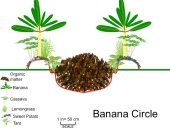Benton Lewis wrote:Anyone know of any dangers of a wild toxic relative cross breeding with crops in your garden? Like deadly nightshade cross pollinating with a tomato?
Potatoes grown from seed are sometimes a bit on the wild side... They are sometimes bitter -- meaning that they are poisonous. No problem, because the poison is well behaved: It tastes nasty and it is very emetic. And it is deactivated by cooking.
One time I grew pocket melons, which are grown for their perfume, in with my muskmelons which are the same species, and they were extremely bitter tasting. So I threw away an entire year's worth of seed production because I couldn't take the risk that the poisonous melon had pollinated my cantaloupes.
Sometimes decorative pepo gourds are poisonous and could affect the crookneck, zucchini, acorn squash, delicatas, etc... The reputation of delicata squash was seriously damaged some years ago when a commercial seed production facility made that mistake.
Some bean varieties are more poisonous than others, but we have known for eons that bean poison is deactivated by cooking. So again, no worries.
A lady grew hot peppers next to my sweet peppers last season. I'm treating my pepper seed as if it has been contaminated by poison creating genes. I really don't like unexpected hot peppers.
As a plant breeder I am constantly tasting my crops to evaluate how poisonous they are. Other than the crops mentioned above, I haven't encountered anything other than the poisons and anti-nutrients that are normally associated with the commonly available vegetables that I grow.










